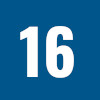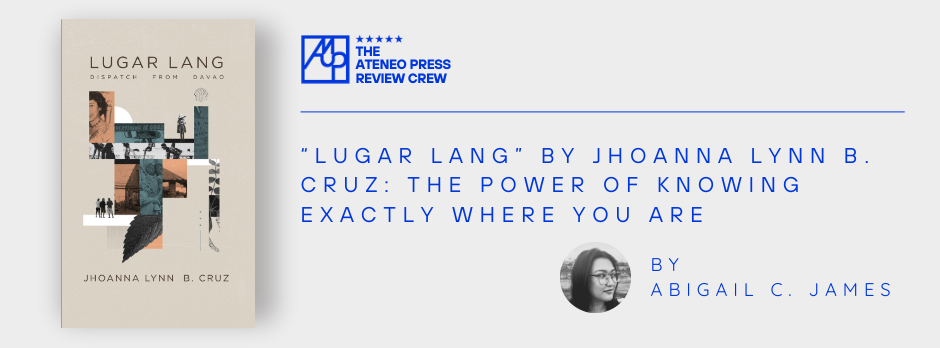[Ateneo Press Review Crew] “Lugar Lang” by Jhoanna Lynn Cruz: The Power of Knowing Exactly Where You Are
25 Apr 2025 | Abigail C. James
Place is a peculiar thing. It can define, it can mangle, it can isolate when there is lack of it. It can welcome, it can rebuke, it can challenge and complicate. Place is not just geography, it is also personal and about identity. People have such loyalty to places and so place can blind, dictate. Place can also be dangerous, unforgiving, and exclusivist. Perhaps most importantly, place can be empowering, especially when you know it, embrace it, and want to change it for the better. This is what Jhoanna Lynn Cruz does in her collection of essays, Lugar Lang: Dispatch from Davao. Here she confronts place and all its intricacies, writing in, about, and from Davao during a time of political and ethical turmoil. The result is a time capsule of misgivings and hopes for the city, Mindanao, and the country as a whole.
In the introduction, Cruz details how her editorial opinion column was born after being invited to have a spot in the Mindanao Times. She chose the title “Lugar Lang” to connect with the Binisaya phrase said when on public transport and wanting to be dropped off (the equivalent of “para” in Filipino). She explains that it means finding the right place to stop which is always important. This idea becomes the impetus for her writing. Though Cruz is a settler in Mindanao, I found her dedication to immersing herself in the culture and customs of the place admirable. Throughout the book, she negotiates her position as an “outsider,” though she has pledged allegiance to her new home for many years. By the beginning of the column, she has been in Davao for almost a decade, and yet there is still that struggle to be recognized. As a response, Cruz turns to activism and uses her voice to advocate for causes that can have a positive impact. In this, it shows that one may be born “Mindanaon” but only those who act may become “Mindanawon.”
Reading this collection made me find my own history as a writer from Mindanao, a queer woman, and a Filipino. Cruz discusses painful topics such as the drug war, the dissonance of those who supported it, and the instigators behind it. These issues recall the dark period of impunity in our country, a time that seems to have been erased from consciousness because of the pandemic. It is all the more relevant to current events. She covers the Marawi Siege and Martial Law in Mindanao, highlighting the efforts to dissent made by the activist group Konsensya Dabaw against unjust proclamations and decisions by the former regime. Lugar Lang serves as a beacon against forgetfulness.
Cruz also opens up about sexuality and her stance on feminist issues. She uses unique literary techniques to explore the epistemic presence of patriarchy in the Philippines and criticize the machismo that pervades our culture. She speaks as a mother and a woman, an educator and a cultural worker. She makes her stances clear, which is refreshing in a time of fence-sitting and fear.
Her calls to action for writers in particular resonated with me. Having met Dr. Jho back in 2014 during my first-ever writers’ workshop in Davao, I will always associate her with the catalyst that began my writing life. During times of strife and the rise of global fascism, writers' and artists’ roles to dismantle harmful power structures are all the more crucial. Cruz takes this responsibility seriously in her column, even when the political climate made it incredibly dangerous. She does this with a skillful talent in the craft. Her characteristic voice in writing shines through, sarcastic, biting, but also moving and sincere, which is the reason why I always include her essays in my creative writing classes.
It is unfortunate and an injustice that her column had to end because of death threats. However, with the publication of this book, her efforts have been preserved. If someone were to ask me who is the audience for this collection, I’d say everyone. Lugar Lang says things that everyone needs to hear, especially in an era of post-truth and censorship. However, I’d doubly recommend it if you are from Mindanao or want to know more about this land.
Though she is acutely aware of her origins, Cruz chronicles her current context to the extent that the columns in Lugar Lang become a lived history. It is done in such a manner that makes it expansive but also intimate. It is an invitation to assess our own places in which we belong and what we can do to earn that belonging. This collection makes it clear that once we put in the work, we can find the right place para mag lugar.
Get your copy in paperback: Website | Lazada and Shopee
:









